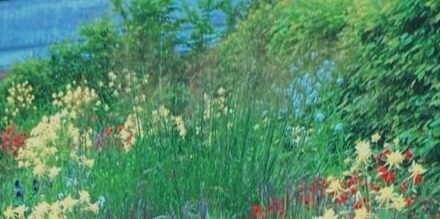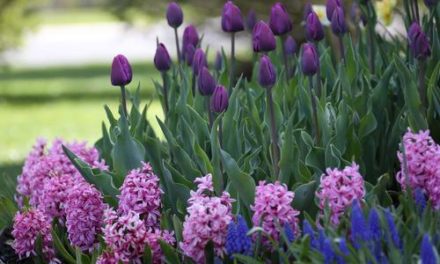Top 20 Tips of a Former Head Gardener
On 31 January ODGC welcomed Pip Smith, former Head Gardener at Wollerton Old Hall, Shropshire, now a garden designer, as its first speaker of 2023. His tips are garnered from his own experience and from the most frequently asked questions by garden visitors.
His talk was split into three sections: design, techniques and planting. For Pip, planning is the key and we were urged to make notes and take photos throughout the year to help plan for the next. Borders containing early bulbs, mid- season perennials and a framework of shrubs will look good throughout the year. Texture is important – a mixture of hard landscaping and different leaf textures is effective and we were encouraged to use pots to make an impact and to consider raising some to head height.
The rising cost of living encourages gardeners to be thrifty, to grow more plants from seeds and cuttings and to swap plants with friends. The use of water butts, watering in the evening and mulching saves water and remember to feed plants! Taking action against pests and diseases whilst the populations are small will prevent major outbreaks. We were told that the best lawns look a mess in Autumn as a result of scarifying and advised that if time is short trimming the edges will smarten lawns up. Secateurs should be used correctly and kept clean and sharp.
It is important to choose the right plants for the soil conditions and aspect. Pachysandra, Brunnera and Epimedium will thrive in dry shade and Pip’s top drought resistant plants include Agapanthus and shrubby salvias. Easy plants for beginners include Nepeta and Geraniums. When planting bulbs the larger the drift, the greater the impact; tulips should be planted deep to encourage long straight stems. Above all, if a plant does not thrive after three years give it up!

Pip ended his talk with a masterclass on secateur care showing us how to sharpen them and cosset with camellia oil. His blend of imaginative design tips and practical advice provided the ideal springboard for the club’s new season.
His top 20 tips and items used in his secateur sharpening demonstration can be found below.
Pip giving a secateur sharpening demo.
Top 20 Tips
- Planning is the key – make notes throughout the year to help you plan for the next
- Be a thrifty gardener – Rummage in garden centre reduced sections, grow from seed or swap plants with your friends and neighbours
- Texture makes a garden more interesting – think about paving, features and leaf textures
- If it doesn’t grow after 3 years, give up! – don’t waste time on plants that just will not grow in your garden
 Use pots to make an impact – singular feature pots or cluster together for maximum effect
Use pots to make an impact – singular feature pots or cluster together for maximum effect- Borders for all seasons – consider bulbs for early colour, perennials for peak season and shrubs for winter interest
- Remember to feed! – Use liquid, pelleted and slow release granular feed to keep your borders looking tip top
- The best lawns look a mess in the autumn – Remember to scarify, aerate and top dress your lawns so they look fresh and lush the following year
- Short of time? – Just do the edges
- Compost! – air and sun are really important so don’t hide the heap in the shade.
- Use secateurs correctly and remember to keep clean!
- Tie to the wire – use soft twine to fix climbers to any supports. Don’t push stems behind the wire where they might rub
- Beating pests and diseases – Keep a look out for them and treat them before the population begins to grow
- How to have success with cuttings – Remember its all about the time, size, humidity and amount of water.
- Save on watering – water in the evening, use a watering can, save water in a waterbutt, have fewer pots, opt for drought resistant planting and apply a dressing of mulch
- Easy plants for the beginner – try perennials such as geraniums or nepeta
- Plant tulips as late as you can – December is best in order to get a good strong, straight stem and quality flower
- The bigger the drift, the bigger the impact – plant plenty of bulbs to get a good effect
- Plants for that awkward dry shady spot – Pachysandra, Brunnera and Epimedium will thrive once established
- Top drought resistant plants – Agapanthus for pots, Catanache caerulea for a splash of summer colour and the tough hardy shrubby Salvia’s such as Salvia ‘Lemon Pie’
Items used in secateur sharpening demo:
Camellia Oil – £7.50
Black Oil Dispenser – £11.50
Crean Mate – £15
Sharpening Stone 1000 – £15
Niwaki GR Pro Secateurs – £85
Niwaki Forged Snips – £32
All available from: Niwaki.com
Discount Code to get 14% off – FORLOVERS – Apply at checkout. Valid until 14th Feb 2023








